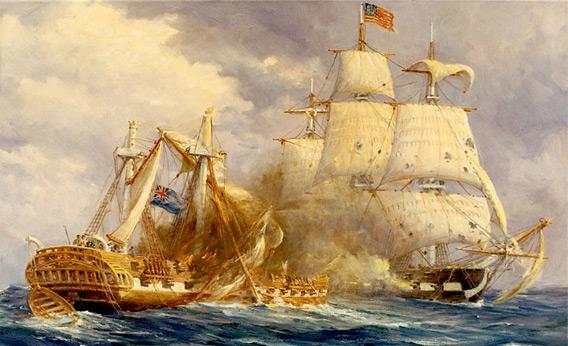Sometimes fact is stranger than fiction; sometimes it’s
equally strange. According to Leonard Wibberley, author of The Mouse that Roared, in 1955, the Duchy of Grand
Fenwick had armed forces comprised of 700 bowmen and 20 men-at-arms. Its most advanced weapon was the
longbow. Nevertheless, this small
country declared war on the then nuclear-armed United States, and subsequently
launched an invasion against the US.
If we turn back the pages of history 200 years, United
States in 1812 was a fledgling country with fewer than 7000 troops and a navy
of only 16 warships. It nevertheless decided
to declare war on Great Britain, arguably the most powerful nation in the world
at the time. Britain had an army of over
a quarter of a million men, and a navy of 600 warships.
What boosted American confidence was Canada, the low-hanging
fruit. At the time, the population of
Canada was a mere 300,000; compared with America’s 8 million. Thomas Jefferson had declared, “The acquisition
of Canada, this year … will be a mere matter of marching.” Jefferson’s words returned to haunt him after
the first two attempts at invasion ended by the complete surrender of American forces.
The American navy fared better. Although we had nowhere near the naval power
to challenge the British strategically at sea, America won moral victories in
single ship duals with British frigates.
We all learned of one such victory – the Constitution versus the Guerriere
– in grade school. It was
disheartening enough to the British that George Canning, Britain’s foreign
secretary, told parliament that these American victories threatened nothing
less than “the sacred spell of the invincibility” of the royal navy.
The real turning points in the war, however, were the
American naval victories of Commodore Oliver Perry in the battle of Lake Erie
and Commodore Thomas MacDonough (any
relation?) in the battle of Lake Champlain.
These thwarted British invasions of the US from the north and, when the
Duke of Wellington advised his government that no victory in America could be
achieved without naval superiority in the Great Lakes, a peace treaty was only
a matter of time.
The War of 1812 was not James Madison’s finest hour. His refusal to make full use of the navy and
the bungled attempts at the invasion of Canada showed him to be something other
than a man of action.
Madison, however, by the end of the war, distinguished
himself in two ways. First, he showed
that he could learn and at some point began to recognize the importance of a
strong American navy. But, more
importantly, throughout the entire conflict, he stuck to his republican
principles. Unlike the Federalists who,
during the quasi war with France in 1789 passed the alien and sedition act and
otherwise tried to suppress the opposition, Madison, as one admirer put it,
withstood widespread opposition to the war, “without one trial for treason or
even one prosecution for libel.”
Anton Otto painting depicting the victory of the USS Constitution over HMS Guerriere

1 comment:
Fact does sometimes appear to be stranger than fiction, as for some strange coincidence, Bill, Pete and I were all talking about this recently. Or was it Steve and Ted and Bill and I? Sometimes fact is fiction. In any case, we were trying to come up with a decent reason why the U.S. started the War of 1812. I think Steve (yes, Steve must have been there) convinced us that it was mainly to grab territory from Canada. (I guess most countries' wars are the desire to take land from your neighbors.)
Now, is the Mouse that Roared symmetry about the tiny U.S. defeating the mighty Great Britain (for the 2nd time) or about the tiny Canada defeating the mighty U.S. invasion?
Incidentally (from Wikipedia),
"Canada also emerged from the war with a heightened sense of national feeling and solidarity, having repelled multiple American invasions. Battles such as the Battle of Queenston Heights and the Battle of Crysler's Farm became iconic for English-speaking Canadians. In Canada, especially Ontario, memory of the war retains national significance, as the invasions were largely perceived by Canadians as an annexation attempt by America seeking to expand US territory. In Canada, numerous ceremonies are scheduled in 2012 to commemorate a Canadian victory."
Post a Comment